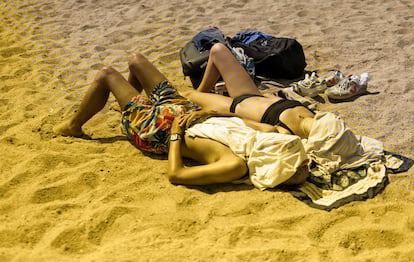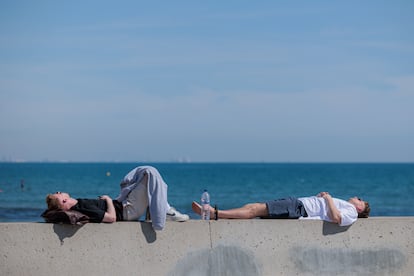Summer pleasures: Losing track of time and not knowing whether it’s Sunday or Wednesday
On vacation, life ceases to be ordered by clocks and is instead governed anarchically by the sun, hunger, leisure and sleep. And we wonder, is it possible to abolish schedules?

“At what point did my life become accessible only on vacation?” Azahara Alonso asked herself when she arrived in Gozo, a small island in Malta. There, the Spanish philosopher intended to regain control and enjoy life on sabbatical; her only purpose was to be unproductive. Things turned out well for her, as she began to create Gozo, a novel essay in which she reflects on free time and tourism; it’s poetic praise of laziness. “I often wonder how long it takes to do nothing,” she reflects in its pages. Alonso devoted a year to doing that. She was able to do so thanks to a scholarship, a frugal lifestyle and some not-so-regular jobs, as she recounts in her book. “It’s partly fictionalized, the experience wasn’t exactly the same,” she says in an exchange of audio messages. For her, as for most people, this lifestyle is only available during vacation.
One of summer’s greatest pleasures is taking off one’s watch. In doing so, one sees how the mark it leaves on the wrist, the snowy shadow of routine, begins to fade from our skin. As the sun erases the signs of our real life, that life begins to seem stranger, more alien, until it disappears. The nagging question of “what time is it?” begins to be replaced by much more interesting ones like “what are we having for dinner today?” Schedules begin to fray around the edges. They cease to be dictated by the clock and are instead governed anarchically by the sun, hunger, leisure and sleep. One begins to lose track of time but get healthier. And when enough time has passed, the calendar blurs as well, and one doesn’t quite know what day of the week it is.
“The mind can’t perceive time directly,” explained Adam Osth, a memory psychologist at the University of Melbourne, in an article in The Conversation. But “there are often a number of cues in our environments that signal what day it is.” These cues are usually work-related: on weekdays you take public transport, you go to the office, you eat out of Tupperware. On Wednesdays, you have painting or perhaps swimming. On Fridays, you go out with friends and on Sundays you eat at your parents’ house. And then it’s back to square one. But these signals are altered when we go on vacation.
In particular, this happens when we visit a place we’ve seen a thousand times: we are not tourists but simple loafers, and we travel back to childhood rather than to a specific geographical destination. “I think it recaptures that way of living, this break that connects with what is most human, which [is] not having the sense of wasting time, but rather of enjoying it,” reflects Alonso.

The history of the clock is closely tied to the history of capitalism. In agricultural economies, time was more in tune with the natural rhythms of days and seasons. But with industrialization and the advent of railroads in the early 20th century, humanity was forced to establish rigorous timekeeping. Tiny clocks clung to workers’ arms like mechanical ticks. You could know what time it was at any hour. Julio Cortázar used to say that when someone gives you a watch, in reality, you are the gift. And that is what happened. Millions of watches were bought and given away, tying us to time. Since then, the working day has conditioned our lives, establishing even free time as priced, measured and timed.
In 2019, the Norwegian island of Sommaroy declared that it was abolishing time to become the world’s first time-free zone. The news was too good to be true: within days, it was found to be part of an advertising campaign. But the ad’s virality made society ask a tantalizing question: can we stop measuring time?
“There are three times that govern our chronobiology,” explains María de los Ángeles Rol de Lama, a professor of Physiology and the director of the Chronobiology Laboratory at the University of Murcia (Spain), in a telephone conversation. “There is the internal one, which influences our biological clock; the environmental one, which is mainly comprised of natural light-dark cycles, and the social one.” The last one—which is determined by our work schedules and measured to the second by clocks—is the one that relaxes during the holiday period, and it is the one that we could abolish, letting the other two govern our lives.
Our internal clock, defined by so-called circadian rhythms, is not exact and varies from person to person. “There are night owls and early birds,” the expert explains. “Morning people are active right away, and in the evening, they lose steam quickly. Night owls… are the opposite,” she adds. During vacation, night owls and early birds fly freely, but sooner or later they must return to their cages. Then, they put a watch on their wrists like a flattering new shackle and submit to capitalism’s strict schedules.
That’s what Azahara Alonso had to do, figuratively speaking, when she returned to Spain. Although she abides by its dictates (“it’s impossible to detach oneself”), she maintains an aversion to the clock and a vague fear of the calendar. “They give too clear an idea of finitude and how we are wasting hours on unchosen obligations that are [necessary for survival],” she explains in a final WhatsApp audio message. She then apologizes for the format of the conversation. She would have preferred to have a phone chat with her interviewer, but she’s swamped and doesn’t have time. “You know, I’m… hung up on the clock,” she laments.
Five summers when the author completely lost track of time
The summer I discovered Stephen King: I may have been physically in Jávea, Spain, but mentally I spent two months in Maine, the setting for all of the author's novels. I was 14 years old, and I was fascinated. I read his books on the beach, smearing them with sunscreen and sand; on the sofa in my apartment, while everyone else was napping; in my bed, until the wee hours of the morning....
The summer I learned to catch a wave: Once, at a job interview, the human resources manager asked me about my greatest virtue. I told him that I could catch a wave. Not with a surfboard or anything, just with my hands. I even did the pose, with both arms raised as if I were Superman stranded on land or an exalted man of indistinct ideology. Obviously, I didn't get hired, but the anecdote serves to illustrate that the summer I learned to surf bareback was the happiest of my life. I still think that knowing how to catch a wave is my greatest virtue.
The first summer I got a failing grade: Many students experience failure as a drama. For me, it was an escape, an excuse to stay home alone for the first time, at the age of 16. So, I exchanged my Stephen King books for math books and the waves for parks at sunset. Madrid in August is an empty and fascinating city, a movie set where, for the first time, I was the main character.
My summers in Ibiza: For a while, I had the best job in the world. I wrote for the magazine of a famous Ibizan nightclub. Basically, my job consisted of going to clubs, restaurants, beaches and concerts and writing about it. The only schedule I had was the one set by the printer once a month. Checking which DJ was working that night was the most practical way to know what day of the week it was.
My honeymoon: There is nothing in the world tackier than a honeymoon trip to all-inclusive Caribbean resorts. There's also nothing cooler. All I had to worry about was where we were going to eat (and drink), which temples and cenotes we had to visit and which paradisiacal beach we’d go to for a swim. Besides, it's a 15-day vacation given to you by the state and a trip given to you by your guests. You have to get married more often.
Sign up for our weekly newsletter to get more English-language news coverage from EL PAÍS USA Edition
Tu suscripción se está usando en otro dispositivo
¿Quieres añadir otro usuario a tu suscripción?
Si continúas leyendo en este dispositivo, no se podrá leer en el otro.
FlechaTu suscripción se está usando en otro dispositivo y solo puedes acceder a EL PAÍS desde un dispositivo a la vez.
Si quieres compartir tu cuenta, cambia tu suscripción a la modalidad Premium, así podrás añadir otro usuario. Cada uno accederá con su propia cuenta de email, lo que os permitirá personalizar vuestra experiencia en EL PAÍS.
¿Tienes una suscripción de empresa? Accede aquí para contratar más cuentas.
En el caso de no saber quién está usando tu cuenta, te recomendamos cambiar tu contraseña aquí.
Si decides continuar compartiendo tu cuenta, este mensaje se mostrará en tu dispositivo y en el de la otra persona que está usando tu cuenta de forma indefinida, afectando a tu experiencia de lectura. Puedes consultar aquí los términos y condiciones de la suscripción digital.









































